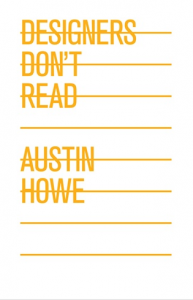
You can listen to the show here, subscribe via RSS or subscribe to the show in iTunes! Don’t forget to leave feedback and thanks for listening! :)
It’s Episode 10 (double digets, baby!) Who says, “designers don’t read?” OH… right… our book this time around is Designers Don’t Read by Austin Howe.
Leave a comment, or send us a message on twitter to @pagebreakpdcast.
Refereces/ Suggested Reading
In this episode we mention Interlink Conference, Ribbons of Red, Clients From Hell, Frank Chimero, Denise Jacobs, My Green Lake, Rocket Mouse, Gotham Ultra Bold Italic, Helvetica, R-E-S-P-E-C-T, Crazy Cat Lady on E-Harmony, MxPx (boo!), Roadside Monument (yay!)
Read it yourself
Buy online at Amazon.
Also on Kindle.
What are we reading for June? If you want to know, you’ll have to listen to this episode! If you have suggestions for future books to be read for the show, questions for us or just something you need to say — contact us on Facebook, Twitter, join our GoodReads Pagebreak Podcast group or send us an email.
Leave a Reply




I really gotta stop listening on the train, it prevents me from writing timely comments!
Anyway, let me try and respond to a few things you talked about. First, about design firms and their clients. Obviously, different firms have different clients, and thus have to speak with different voices on their website copy. For example, there are some large firms here in New York (and elsewhere) that _only_ work with finance and insurance clients. They speak in a very particular way. Whereas for small business and startups, say, you can be much more candid and bring some personality.
True, design firms are not known for their own brand identities, but there’s a logic to it. In short, we don’t want to shine brighter than our clients, and by having a simple, consistent brand identity we don’t put in clients head any specific style or personality. They see us as a blank canvas who can deliver for them, not for us. It’s the same logic behind standup comedians who wear all black, because they want the audience to focus on their face and hands, rather than all the distractions of clothing.
As for awards, it’s a tough call. Everyone likes to be acknowledged for hard work, myself included, but I totally agree that some awards are just the result of entering. If a firm can dedicate the resources to entering so damn many, they’re gonna win for sure. But a way to justify that is to view it as a sales effort. All businesses need to do some kind of marketing/sales, and if entering and winning contests makes sense, then go for it!
I disagree with Niki in that I think clients do care what awards the firm has won, especially if it’s their work. It creates exposure for the designers and in turn for the clients. It shows that everyone is hip and modern and forward-thinking (and all that). Everyone likes to read their name in the paper, client and agency alike. Also, remember that hunting for a design firm is often the role of a middle manager or marketing team, not the CEO directly. In building “profiles” of different design firms, the person charged with research may include a quick list of recent awards. This helps lend credibility to the firm, making it a less-risky decision for the boss. So the logic goes.
It may not happen often, but occasionally designers get work and even full-time jobs because someone saw their award-winning entry in such and such competition. With the big magazines and shows, this is even more the case. The biggest example of this is the D&AD in Britain, where winning a pencil — even being featured in the annual book — can literally launch a career. Every year students enter like mad in an effort to attract employers. It’s a lifetime accolade as well, even though you won a student category.
I haven’t read the book, and I wonder if it’s available on audio. That way, I don’t have to read it!